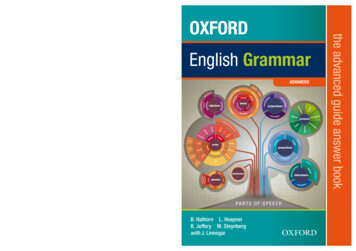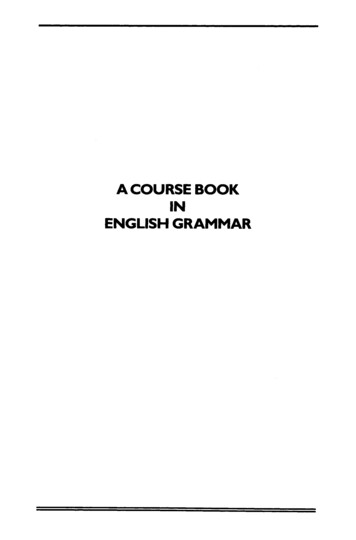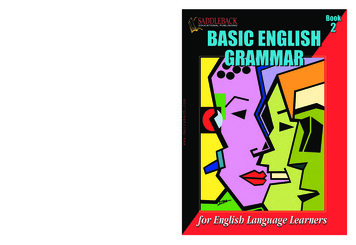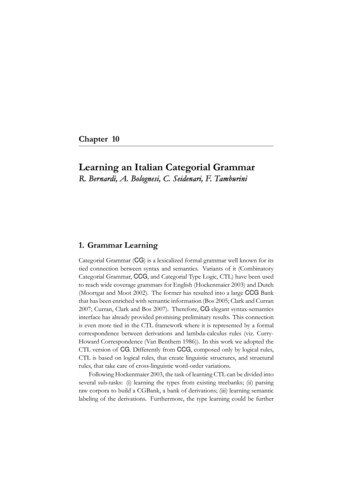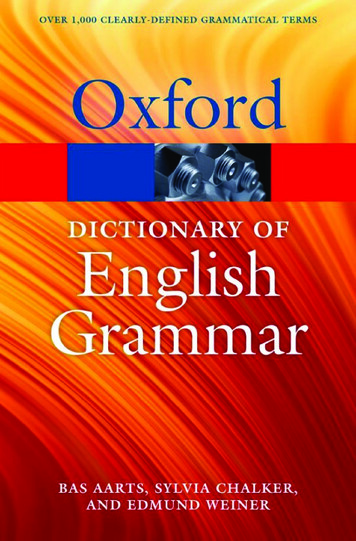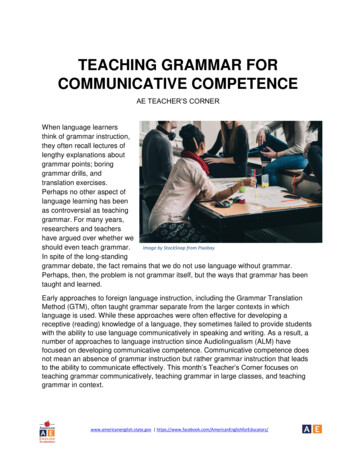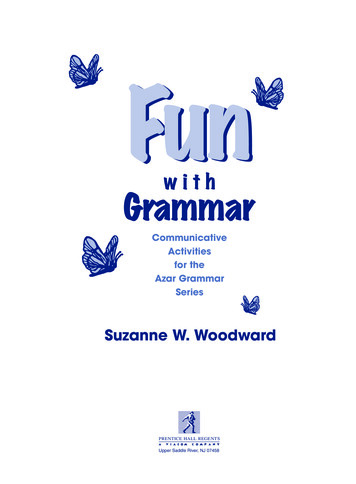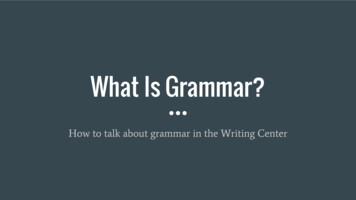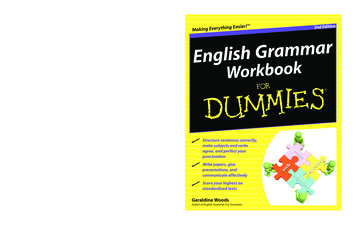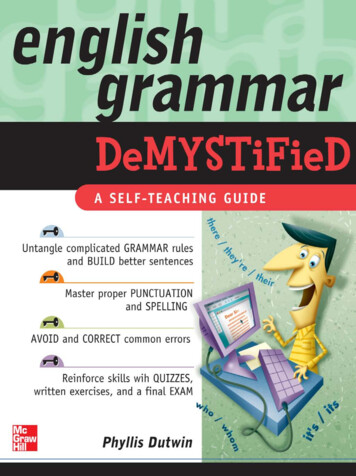
Transcription
English Grammar:Revision and Practice1
Table of contents1 Verbs and Nouns . 32 Verbs and nouns part II . 63 Pronouns. 94 Subjects and Verbs . 135 What makes a sentence . 166 Subject-verb agreement part 1 . 207 Subject-verb agreement part 2 . 248 Different types of verb . 299 The past tense. 3410 The past tense part 2 . 3811 The past tense of ‘be’ . 4112 Common and proper nouns . 4613 Analysing a sentence part 1 . 5014 Analysing a sentence part 2 . 5415 The present progressive tense . 5816 The past progressive tense. 62Spelling record sheet . 662
1 Verbs and nouns part 1Part 1 – Do NowWrite a sentence. Circle all the words in the sentence that are verbs. Underline all the wordsthat are nouns.ExtensionNouns and verbs are parts of speech. Write down the names of any other parts of speechyou know, and try and give examples of them.Part 2DefinitionA verb is a doing word.Examplesrun, walk, skip, act, write I walked to the shop I played football I like that autobiographyPart 2aCircle the verbs in each of the following sentences. Abdul enjoyed the lesson. Amy goes to three different clubs. My friends dislike crisps. My brother works in the library. The girl walks to school.3
ExtensionWrite a sentence of your own and circle the verb.Part 3DefinitionA noun is a name, a place or a thing.Examplescar, person, table, chair, desk, Hassan, Wednesday, city, place, Britain Ellis walked to the shop. Georgia played football. The car hit the wall.Part 3aLook again at the sentences you found the verbs in. Now underline the nouns. Abdul enjoyed the lesson. Amy goes to three different clubs. My friends dislike crisps. My brother works in the library. The girl walks to school.ExtensionIn the sentences we have looked at so far, in what order do the nouns and verbs come?4
Part 4Part 4aIn the following sentences, circle all the verbs and underline all the nouns. Ana runs round the park. Angel likes football, but Anwar prefers basketball. My favourite sister eats chips every day. After school, Edson plays netball. The two boys and three girls walk home.ExtensionNow write a sentence of your own. Circle all the verbs and underline all the nouns.5
2 Verbs and nouns part twoPart 1 – Do NowWrite a sentence. Circle all the words in the sentence that are verbs. Underline all the wordsthat are nouns.ExtensionCan you remember what the definitions of nouns and verbs are?Part 2Examples Jodie walks to the shop. Amir eats crisps. My brother and sister like chocolate.Part 2aCircle the verbs and underline the nouns in each sentence. Kwesi dislikes the cinema. Marua owns a computer. My friends walk home.Extension The boy kicks the ball. The girl enjoys school. Write three examples of your own.6
Activity 2bCircle the verbs and underline the nouns in each sentence. Omar and Simon run around the park. Omar and Simon go for a run around the park.ExtensionIs the word ‘run’ a noun or a verb? Explain your answer.Part 3Activity 3aCircle the verbs and underline the nouns in each sentence.1. The pupils walk around the park.2. The pupils go for a walk around the park.3. My parents cook food.4. The cook makes food.5. Tom Cruise plays the hero.6. Tom Cruise acts in lots of plays.7. Rashad saw the play at the theatre.ExtensionWrite a sentence where ‘walk’ is a verb. Then write a sentence where ‘walk’ is a noun.7
Part 4Activity 4aFill in the dinaryYour examplesMeaning of prefixHomeworkNext week you will be tested on the meaning of these three prefixes, on the spelling ofunhappy, rebuild and extraordinary, and on five other words that use these prefixes.8
3 PronounsPart 1 - Do NowCircle the verbs and underline the nouns in each sentence. The teacher plans the lesson. The pupil learns. My brother and sister go to primary school.ExtensionCan you remember what the definitions of nouns and verbs are?Part 2Activity 2aExplain what sounds wrong with this paragraph.Jack walked to school. When Jack got to the gates, Jack waited for Jack’s friend Omar. Jackwent to the first lesson and Jack did his work.ExtensionRewrite it so that it sounds better.9
Activity 2bFill in this chart.PronounExampleIMy name is Jamie. I like school.YouYour name is Lauren. You are a goodperson.HeYousef doesn’t like the bus, so hewalks to school every morning.SheFatima is hungry because she hasn’teaten since breakfast.ItThe car was speeding when it crashedinto the wall.WeEveryone in year 7 went on the trip.We all enjoyed it.TheySome pupils went on the rollercoaster.They all had fun.HisImran lost the book. His book is theone with the red cover.HerJodie’s car is broken. Her car is theone with the flat tyre.ThemThey are a rich family. The housebelongs to them.Your exampleExtensionGo back and look at each sentence. Underline the noun that the pronoun is referring to.10
Part 3Activity 3aUnderline the pronoun in each sentence.1. Jeffrey, Ali and Sara played football. They won 3-0.2. Yohan is very kind because he always shares his sweets.3. We enjoyed watching the match. It was very exciting.4. The two boys like English. They think it is very interesting.5. I agree with them.ExtensionWrite a sentence of your own that uses two different pronouns.Activity 3bFill in the gaps.1. Jeffrey, Ali and Sara played football. They won 3-0.‘They’ refers to .2. The two boys like English. They think it is very interesting.‘They’ refers to .‘It’ refers to .Part 4Activity 4aFill in the gaps.1. When Bob was a young man, he worked as a builder.‘He’ refers to .2. Gemma stole the biscuits and she ate them later that night.‘She’ refers to . ‘Them’ refers to .11
3. The cards and envelopes are behind the desk. They should be used tomorrow.‘They’ refers to .4. The car is broken. It needs to go to the garage.‘It’ refers to .5. Anwar looked straight at Harry. “I think we need to hide,” he whispered.‘I’ refers to . ‘We’ refers to .‘He’ refers to .6. Ellie read the letter, and then she threw it in the bin.‘She’ refers to . ‘It’ refers to .7. The worried man stood up and spoke to the crowd. “The manager will address you infive minutes,” he said.‘You’ refers to . ‘He’ refers to .ExtensionWrite two sentences of your own like the above. Underneath each one, say what thepronouns refer to.Exit ticket activityWhat is the definition of a pronoun?12
4 Subjects and verbsPart 1 – Do NowCircle the verbs and underline the nouns and pronouns in each sentence. The cat ran across the road. It pounced on a mouse. Syed and Omar saw the animals. They rescued the mouse.ExtensionWhat is a pronoun?Part 2Activity 2aFill in the gapsJessica likes computer games. The subject names the person who does the action. So the subject of this sentence is. The verb tells you what the action is. So the verb in this sentence is.13
Part 3Activity 3aCircle the verbs and underline the subject in each sentence.1. Ali owns four pets.2. He has a cat, a dog and two rabbits.3. The two rabbits live in his garden.4. Ali’s father helps care for them.5. He feeds them when Ali is not there.6. All the animals like Ali.7. They enjoy their life.8. Every morning, Ali takes the dog for a walk.9. They walk around the park.ExtensionPut an X next to the sentences where the subject is a pronoun.Activity 3bWrite two sentences of your own. Circle the verb and underline the subject.ExtensionWrite another two sentences. Make sure that in one the subject is a pronoun, and in theother, the subject is a noun.14
Part 4Activity 4aSpelling test on prefixes1.2.3.4.5.6.7.8.9.10.Activity 4bRecord your score and the words you got wrong in the grid at the back.Activity 4cFill in the chart below.SuffixExample-estcheapest-lessworthlessYour examplesMeaning of suffixHomeworkNext week you will be tested on the meaning of these three suffixes, on the spelling of cheapest andworthless, and on six other words that use these suffixes.15
5 What makes a sentencePart 1 – Do NowUnderline the subject and circle the main verb in the following sentences. He likes football. Jackson and Mohammed walk home. The car crashed into the wall.ExtensionWhat is the subject of a sentence? What is the verb?Part 2 – Identify the sentencePart 2aRead the following sentences. Only one is actually a proper sentence. Underline it.1.2.3.4.5.6.7.he is a strange person.Not liking you.I don’t like himI don’t like that person.Whilst I do not like you.The unpleasant person.I don’t like unpleasant peoplePart 2bWhat makes a sentence? A sentence has to begin with a . A sentence has to end with a , , or. A sentence has to have a . A sentence has to have a . A sentence has to be . A sentence has to .16
Part 3 – Explaining what makes a sentencePart 3aExplain why these are not sentences. The first one has been done for you.ExampleThis is not a sentence because he is a strange person.This is not a sentence because it does not begin with acapital letter.Not liking you.This is not a sentence becauseI don’t like himThis is not a sentence becauseWhilst I do not like you.This is not a sentence becauseThe unpleasant person.This is not a sentence becauseI don’t like unpleasant peopleThis is not a sentence becauseExtensionUnderneath each example, write it out so that it is a correct sentence.17
Part 3bWork out if each example is a real sentence. If not, explain why.ExampleIs this asentence?Yes/NoIf not, explain why.Glaring us.He the boysshouted at.The SecondWorld War.The war endedin 1945.Dying ofdisease.He said no.ExtensionWrite three full sentences of your own. Circle the subject and underline the main verb.18
Part 4 – Answering questions in full sentencesPart 4Answer the following questions in full sentences. Q: What subject do you like the most? A: I like Q: Do you have any siblings? A: I have Q: What do you enjoy doing at the weekend? A: At the weekend, I enjoy ExtensionAnswer the following questions in full sentences. Q: Who wrote Oliver Twist? A: Q: What football team do you support? A: Q: How many people do you need on a football team? A:19
6 Subject-verb agreement part 1Part 1 – Do NowUnderline the subject and circle the main verb in the following sentences. We cooked lots of food. They ate all the food. The children liked the food.ExtensionCopy out the three sentences above but replace the subject with another subject.Part 2 – Different types of subjectPart 2aWrite one sentence in the first person singular and one in the first person plural.ExtensionCan you think of a book you have read that is written in the first person singular?Part 2bWrite one sentence in the second person singular and one in the second person plural.20
ExtensionChange the two sentences you have just written into the first person singular.Part 2cWrite one sentence in the third person singular and one in the third person plural.ExtensionChange the two sentences you have just written into the second person plural.21
Part 3 – The different categories of subjectSingularPluralFirst personIWeSecond personYouYouThird personHe, she or itTheyPart 3bFor each sentence, identify the type of subject.Sentence1. Each night, you should all brush yourteeth.Type of subject1. Second person plural2. Carefully, I climbed the mountain.3. We ate all the food.4. You will enjoy Thorpe Park.5. Every day, she reads a book.6. They crawled up the wall.22
Part 4 – SpellingPart 4aSpelling test on suffixes1.2.3.4.5.6.7.8.9.10.Part 4bRecord your score and the words you got wrong in the grid at the back.Part 4cFill in the gaps.Prefixdis-ExampleYour examplesMeaning ofsuffixdisagreedisappeardisappointHomeworkNext week you will be tested on the meaning of this suffix, on the spelling of disagree,disappear and disappoint, on three other words that use this prefix and on three wordsfrom previous weeks.23
7 Subject-verb agreement part 2Part 1 – Do Now Write a sentence in the first person plural. Write a sentence in the third person singular. Write a sentence in the second person singular.Extension Write a sentence in the first person singular. Write a sentence in the third person plural.Part 2 – Identify the subjectPart 2aWork out the category of each sentence.SentenceType of subject1. You like English the most.1. Second person singular2. I ate all my food.3. Yesterday, we went to the football.4. James walks a long way to school everymorning.5. You are all going on the school trip.6. They have not behaved well enough.24
ExtensionWrite a sentence of your own in each category.SingularPluralFirst personSecond personThird personPart 2bRead the sentences in the box below. Each subject is in the same person. What is it?Part 2cNext to each sentence say if it is singular or plural.SentenceSingular or plural?1. James walks a long way to school everymorning.2. The ant crawls up the wall.3. The ants crawl up the wall.4. The animals live in the zoo.5. The car smashed into the wall.6. The Ferrari was badly damaged.7. They were badly hurt.ExtensionWrite two sentences in the third person singular. Write two in the third person plural.25
Part 3 – Subject-verb agreementPart 3aCorrect the mistakes.SentenceCorrect version1. She like football.2. He enjoy watching TV.3. They cooks food for everyone.4. John and Jason eats all the food.5. We plays football.ExtensionCan you work out the mistake that all these sentences share?Part 3bFill in this chart for the verb ‘run’.The verb ‘run’SingularPluralFirst personI runWeSecond personYouYouThird personHe, she or itTheyExtensionCan you spot the pattern of how most verbs change?26
Part 4 – Identify the category of subjectPart 4aFill in the chart with the correct person and number.SentencePerson and number1. I like crisps.1.First person singular2. They enjoy watching football.3. Every morning, Mohammed gets the bus toschool.4. You will enjoy the film.5. The film is good.6. We liked it.Part 4bWrite a sentence with the following subjects and verbs.1. Write a sentence using the verb ‘drive’ in the third person plural.2. Write a sentence using the verb ‘reject’ in the second person singular.3. Write a sentence using the verb ‘admire’ in the third person singular.4. Write a sentence using the verb ‘eat’ in the first person plural.27
5. Write a sentence using the verb ‘cook’ in the first person singular.6. Write a sentence using the verb ‘smile’ in the second person plural.28
8 Different types of verbPart 1 – Do NowWrite six different sentences that use the verb ‘like’ with all the different subjects.The verb‘like’SingularPluralIWeYouYouHe, she or itTheyFirst personSecondpersonThird personExtensionMake a list of as many different verbs as you can.Part 2 – Different types of verbPart 2aFill in the blanks with the best verbs from the box below. If you need to, change the verb sothat it agrees with the subject.1. Every morning, I cereal.2. At the weekend, he football and television.3. I crisps.4. They chocolate.5. In the zoo, the lion a loud noise.preferlikemakeeat29playwatch
ExtensionWrite three sentences of your own that use the verb ‘demand’ but have different subjects.Part 2bCopy the correct answers into the grid below.The verb ‘be’SingularPluralFirst personIWeSecond personYouYouThird personHe, she or itTheyExtensionWrite a sentence using each subject with the verb ‘be’.30
Part 3 – Using the verb ‘be’Part 3aFill in the blanks with the correct version of the verb ‘be’.1. I 11 years old.2. He a good footballer.3. She better than him.4. You really good at that.5. They happy with the result.6. James and Mohammed good friends.7. My brother my best friend.8. We very close to each other.ExtensionWrite a sentence that uses ‘be’ in the first person singular. Then rewrite the sentence fivetimes using different subjects.31
Part 3bWork out the category of each sentence.Sentence1. She is very unhappy.Type of subjectThird person singular2. Her emotions are negative.3. You are very silly.4. Your behaviour is childish.5. I am a pupil at this school.6. This school is great.ExtensionWhy do you think the verb ‘be’ changes so much more than all the other verbs?32
Part 4 – SpellingPart 4aSpelling test on suffixes1.2.3.4.5.6.7.8.9.10.Part 4bRecord your score and the words you got wrong in the grid at the back.Part 4cFill in the gaps.Prefixim-ExampleYour examplesMeaning of suffiximpossibleimpoliteimmatureHomeworkNext week you will be tested on the meaning of this prefix; on the spelling of impossible, impoliteand immature; on three other words that use this prefix; and on three words from previous weeks.33
9 The past tense part 1Part 1 – Do Now Write a sentence using the verb ‘kick’ in the first person plural. Write a sentence using the verb ‘be’ in the third person singular. Write a sentence using the verb ‘accept’ in the second person singular.Extension Write a sentence using the verb ‘rule’ in the first person singular. Write a sentence using the verb ‘have’ in the third person plural.34
Part 2Part 2aWhat tense are these sentences in?SentenceTense1. I liked cartoons when I was younger.2. Now, I prefer computer games.3. I also enjoy reading.4. They cooked some delicious food for us.5. We admire their skills.6. You asked for two slices of toast.ExtensionWrite one sentence in the past tense and one in the present tense.Part 2bTurn the present tense sentences into the past tense. The first has been done for you.Present tensePast tense1. I walk to school.1. I walked to school.2. I jump over the puddle.3. I type the letter.4. I play the game5. I watch TV.35
ExtensionWrite three past tense sentences where the verbs end in ‘-ed’. Use different verbs fromthose you have used so far.Part 3Part 3aFill in the chart below for the verb ‘cook’.Present tenseSINGULARThe verb ‘cook’Present tensePLURALPast tenseSINGULARPast tensePLURALFirst personIWeIWeSecond personYouYouYouYouThird personHe, she or itHe, she or itTheyTheyExtensionWrite a sentence using any verb in the third person plural past tense.36
Part 4 – Consistent tensePart 4aIn each sentence, one verb is in the wrong tense. Cross it out and above it write the correctverb.1. I walk along the road. I go into the shop. I buy a bar of chocolate. I scoffed thechocolate.2. He typed the essay neatly and handed it to his teacher. His teacher praises the work.She placed it on the wall.3. I followed the man. I walked along quietly. He pretended not to see me. Then heturn around and shouted at me.ExtensionCan you think of any verbs that are in the past tense but don’t end in ‘-ed’?37
10 The past tense part 2Part 1 – Do NowChange each sentence into the past tense.Present tensePast tense1. I push the door.I pushed the door.2. He crashes the car.3. We cycle to school.4. We run around the park.5. They buy a drink.ExtensionWhat is different about the last two sentences?Part 2 – Different types of verbPart 2aChange these verbs to the past tense.Present tensePast tensePresent tenseI runI ranI haveI bringI keepI eatI drinkI fightI sleepI doI goPast tenseExtensionList as many more verbs like this as you can.38
Activity 2bFill in the chart below for the verb ‘take’.Present tensesingularThe verb ‘take’Present tensepluralPast tensesingularPast tensepluralFirst personIWeIWeSecond personYouYouYouYouThird personHe, she or itHe, she or itTheyTheyExtensionWrite a sentence using the verb ‘draw’ in the third person plural past tense.Part 3 – Identify the person, number and tensePart 3aIdentify the person, number and tense of each sentence.SentencePerson, number and tense1. You missed the bus.1. Second person singular, past tense2. I like crisps.3. Yesterday, we cycled to school.4. They enjoy watching football.5. Jane cycles to school.6. It crawled up the wall.ExtensionCopy out the sentences above but change the subject in each one.39
Part 4 – SpellingPart 4aSpelling test1.2.3.4.5.6.7.8.9.10.Part 4bRecord your score and the words you got wrong in the grid at the back.Part 4cFill in the gaps.SuffixExample-ablebreakableYour examplesMeaning of suffixacceptablereadableHomeworkNext week you will be tested on the meaning of this suffix, on the spelling of breakable,acceptable and readable, on three other words that use this suffix and on three words fromprevious weeks.40
11 The past tense of ‘be’Part 1 – Do Now Write a sentence using the verb ‘run’ in the first person plural, past tense. Write a sentence using the verb ‘catch’ in the third person plural, past tense. Write a sentence using the verb ‘buy’ in the third person singular, present tense.ExtensionWe have only learnt about the verb ‘be’ in the present tense. Can you write a sentencewhich uses ‘be’ in the past tense?Part 2 – The verb bePart 2aWrite a sentence using the verb ‘be’ in the third person singular.ExtensionWrite a sentence using the verb ‘be’ in the third person plural.41
Part 2bFill in the blanks.The verb ‘bePresent tenseSINGULARPresent tensePLURALPast tenseSINGULARPast tensePLURALFirst personI amWe areIWeSecond personYou areYou areYouYouThird personHe, she or it isThey areHe, she or itTheyPart 3 – ‘Be’ in the past tensePart 3aFill in the correct form of ‘be’ in the past tense for all of these sentences.1. Two years ago, I11 years old.2. Last week, hethe best student in the class.3. Wevery pleased with yesterday.4. Youreally good at the concert last night.5. Sarahappy with the result.6. Before the fight, theybest friends.ExtensionRewrite these sentences so that they are in the present tense.42
Part 3bSome of these sentences have mistakes. Cross out the incorrect words and write in thecorrect words.1. They was both a bit silly.2. The bikes was broken.3. The bike was broken.4. We was robbed!5. You was wrong about that.6. He was very happy with what happened.7. I was unhappy with that decision.8. I were 11 years old.ExtensionWrite an explanation of exactly what is wrong with the incorrect sentences.Part 4 – Consistent tensePart 4aThere are three mistakes in the following paragraph. Find them all and correct them.When we found out we were going to Thorpe Park on a school trip we was all delighted. Iwas particularly looking forward to it because I love theme parks. My friend Harry was notas excited because he gets sick on the high rides. The teachers seemed quite excited too.They was planning which rides they would go on. We are all very happy about the trip.43
ExtensionExplain why each mistake is wrong.Part 4bWrite a sentence with the following subject, verb and tense. Write a sentence using the verb ‘be’ in the third person plural, past tense. Write a sentence using the verb ‘be’ in the second person singular, present tense. Write a sentence using the verb ‘be’ in the third person singular, past tense. Write a sentence using the verb ‘eat’ in the first person plural, past tense. Write a sentence using the verb ‘smile’ in the first person singular, present tense. Give me a sentence using the verb ‘catch’ in the second person plural, past tense.44
ExtensionDesign a quiz like this with six questions. Write the answers underneath!45
12 Common and proper nounsPart 1 – Do NowCircle the verbs and underline the nouns and pronouns in each sentence.1. The cat ran across the road.2. It pounced on a mouse.3. James is 11.4. He had a big birthday party.ExtensionCan you remember the definition of a noun and pronoun?Part 2 – Different types of nounPart 2aGive five of your own examples of proper nouns.Examples of proper nounsYour examples of proper nounsLondonJohnAnaEnglandBritain’s Got TalentExtensionPick one of these proper nouns and use it as the subject in a sentence.46
Part 2bGive five of your own examples of common nouns.Examples of common nounsYour examples of common nounscitymanwomancountrycarExtensionPick one of these common nouns and use it as the subject in a sentence.Part 2cThink of three proper nouns that are made up of more than one word. Write them down.Examples of proper nouns made up of morethan one wordYour examples of proper nouns made up ofmore than one wordGreat BritainUnited KingdomMr SmithBarack ObamaManchester UnitedExtensionWrite a sentence that uses three proper nouns and one common noun.47
Part 3 – Finding errorsPart 3aSome of the words below are wrong. Correct the errors.NounsCorrect it if it’s wrong1. david Beckham2. car3. United Kingdom4. Mr cameron5. city6. Barack obama7. Bicycle8. Buckingham palace9. queen Elizabeth10. FerrariExtensionExplain why each error is wrong.48
Part 4 – SpellingPart 4aSpelling test1.2.3.4.5.6.7.8.9.10.Part 4bRecord your score and the words you got wrong in the grid at the back.Part 4cFill in the gaps.SuffixExample-edworkedYour examplesMeaning of suffixappearedappointedHomeworkNext week you will be tested on the meaning of this suffix, on the spelling of worked,appeared and appointed, on three other words that use this suffix, and on three words fromprevious weeks.49
13 Analysing a sentence part 1Part 1 – Do NowCircle the proper nouns, underline the common nouns and place a squiggly line under thepronouns. Ali watches television. He likes watching Britain’s Got Talent. It is his favourite programme.ExtensionWhat is the subject of a sentence? What is the verb?Part 2 – Identify the subjectPart 2aUnderline the subject and circle the main verb. Ali watches television. He likes watching Britain’s Got Talent. It is Ali’s favourite programme.ExtensionIdentify the person and number of each of the above sentences.50
Part 2bFill in this grid for the verb ‘make’.The verb ‘make’SingularPluralFirst personI makeWeSecond personYouYouThird personHe, she or itTheyExtensionWrite a sentence using the verb ‘be’ in the third person plural.Part 2cSubject-verb agreementWrite a sentence using the verb ‘react’ in the third person singular.Write a sentence using the verb ‘stroll’ in the first person plural.Write a sentence using the verb ‘lie’ in the second person singular.ExtensionWhat does the tense of a sentence tell you?51
Part 3 – TensePart 3aFill in the correct forms of ‘be’ in the past tense.Present tensePresent tenseThe verb ‘be’singularpluralPast tensesingularPast tensepluralFirst personI amWe areIWeSecond personYou areYou areYouYouThird personHe, she or itisThey areHe, she or itTheyExtensionWhat are the main mistakes people make with the verb ‘be’?Part 3bWrite a sentence using the verb ‘be’ in the third person plural, past tense.Write a sentence using the verb ‘be’ in the third person singular, past tense.Write a sentence using the verb ‘smile’ in the first person singular, present tense.Write a sentence using the verb ‘catch’ in the second person plural, past tense.52
ExtensionDesign a quiz like this with four questions. Write the answers underneath!Part 4 – Subject, verbs and tensePart 4aIdentify the subject, verb, person, number and tense in the following sentences. The firstone has been done for you.Sentence1. Barack Obama is thePresident.2. Yesterday, we ate lots offood.Explanation1. This sentence is in the third person, it is singular andit is in the present tense.2. This sentence is in theand it is in the3. This sentence is in the3. You said some funny things.and it is in the4. This sentence is in the4. Ali and Sara agree with you.and it is in theperson, it istense.person, it istense.person, it istense.ExtensionRewrite each sentence so that the subject is different.53
14 Analysing a sentence part 2Part 1 – Do NowFind the errors in the following sentences and correct them. Every day, he practise playing football. The people cheers the players. After the match, the players was very happy.ExtensionExplain why they are mistakes.Part 2 – Spotting errorsPart 2aAll these sentences have a mistake. Correct them.1. Oliver Twist runs away to London2. at this time, London was the largest city in the world.3. London largest city was.4. Which was very
English Grammar: Revision and Practice . 2 Table of contents . The two boys like English. They think it is very interesting. They refers to _. It refers to _. Part 4 Activity 4a Fill in the gaps. 1. When Bob was a young man, he worked as a builder. ‘He’ refers to _. .File Size: 964KB
